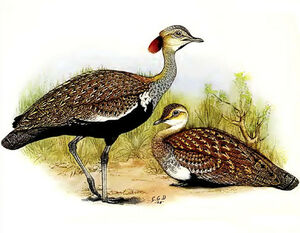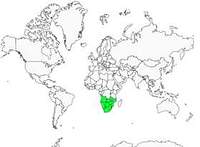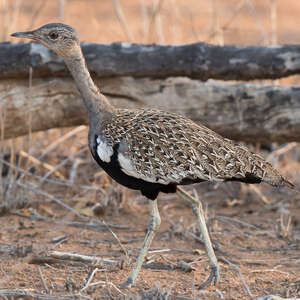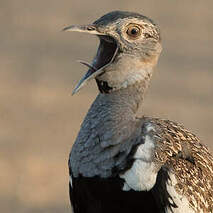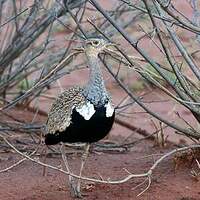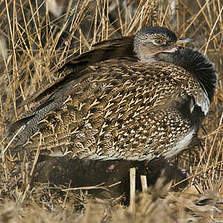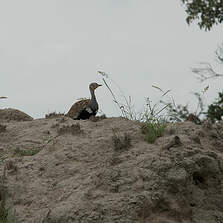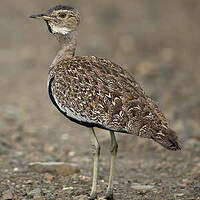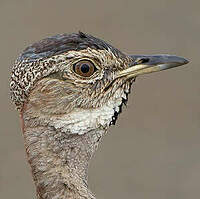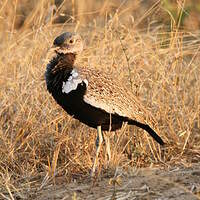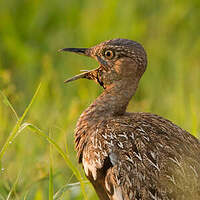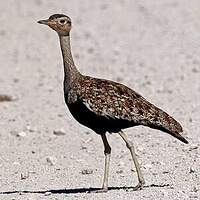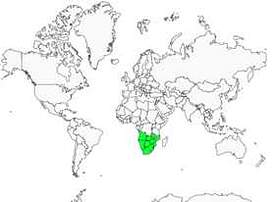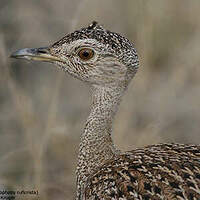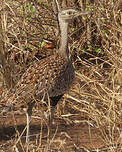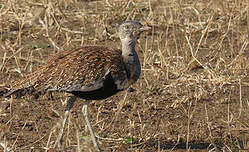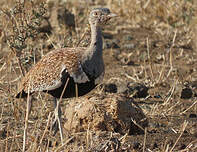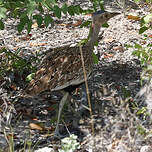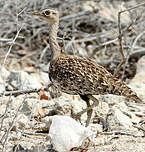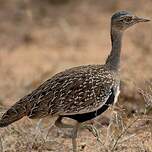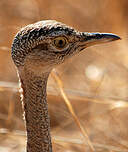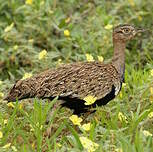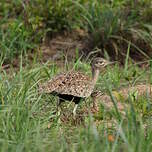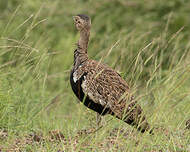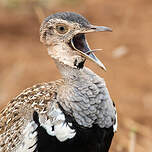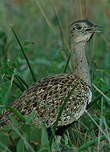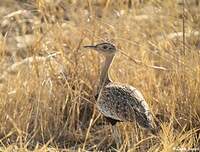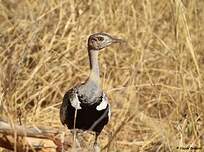Red-crested Korhaan
Lophotis ruficrista - Outarde houppette
Identification
Some authors consider the Oustalet's Houbara, the Savile's Houbara and the Red-crested Korhaan as three subspecies of one same species. Others consider them three separate species owing to their anatomical features, nuptial displays and distinct songs. Here, I only describe the type species Eupodotis ruficrista.
The male Red-crested Korhaan has a gray head with a large black band on the top of the head, and a reddish-brown plumage zone on its neck, which has given it its English name of Â"Red-crested BustardÂ". Its beak is short and gray. The adult's back is light brown with black and fawn spots. The neck is grayish-fawn, the chest white, the belly and the undertail brown. Its legs are grayish-yellow and it has three thick toes, like most houbara bustards.
The female has a browner head, a reduced crest and a wide white band across the bottom of the chest.
The sexual dimorphism is the highest during the nuptial period, and is limited mainly to the colour of the plumage.
Immatures resemble the females.
Subspecific information monotypic species
Foreign names
- Outarde houppette,
- Sisón moñudo austral,
- sisão-de-poupa-vermelha,
- Rotschopftrappe,
- vörösbóbitás túzok,
- Zuid-Afrikaanse Kuiftrap,
- Otarda crestarossa,
- sydlig tofstrapp,
- Rødtopptrappe,
- drop hrdzavochochlatý,
- drop chocholatý,
- Rødtoppet Trappe,
- punatöyhtötrappi,
- Boskorhaan,
- sisó crestat,
- dropik rdzawoczuby,
- Рыжехохлый корхан,
- カンムリショウノガン,
- 红冠鸨,
- 鳳頭鴇,
Voice song and call
During the mating display, they sing in duet with a rapid wuk-wuk-wuk_wuk which increases in volume and frequency until it becomes a wuka-wuka-wuka-wuka. Their territorial song is a series of rapid Tic-tic-tic-tic turning into a piercing and sharp phee-phee-phee-phee whistle. Among gruids, the Red-crested Korhaan is one of the few to emit whistles, such as Oustalet's and Savile's.
Habitat
The Red-crested Korhaan is practically endemic to the southern regions of Africa. It loves arid and semi-arid regions that provide protective vegetation. It can be found in dense or light woodlands where the Mopane (Colophospermum mopane) tree grows, a tree that is very common in these lands. It is able to withstand very high temperatures day and night.
Distribution: South Africa, Angola, Botswana, Mozambique, Namibia, Zambia.
Behaviour character trait
She is usually seen alone or in pairs in bushes. At other times, they can be encountered in very large groups.
The mating display is very spectacular. Male displays begin with singing and then they take off in a steep vertical flight of about twenty meters. At the top of their climb, they roll their body backwards, legs up, and then fall with their wings spread out. Very rarely, it has been observed that, in the state of excitement, the male misses his landing. The aerial display is usually directed at a female, but it seems they also use this demonstration to mark their territory and to ward off other suitors. When a female is contacted, the feathers on the crown stand up to form a crest. The feathers of the throat and neck swell. Once copulation is accomplished, the male takes off and starts another display, looking for another female.
The Red-crested Korhaan doesn't have uropygial glands, which forces it to take dust baths to clean itself. The Red-crested Korhaan is one of the few birds that drinks by sucking, unlike most birds which take gulps.
Although movements are correlated with precipitation and food availability, this bird can't be categorized as a true migratory bird.
Flight
Dietfeeding habits
The Red-crested Korhaan is omnivorous. It has a marked preference for fruits, berries and seeds. It usually searches the ground for food.
Insects have a large part in its diet and particularly during the rearing period of the young. It consumes, among other things, beetles, beetle larvae, grasshoppers, ants and centipedes. These invertebrates are usually caught in flight. Occasionally it catches small vertebrates such as leverets and various small rodents. It grabs these small mammals on the ground and kills them with its claws before eating them.Reproduction nesting
Sexual maturity seems to be reached between 10 and 12 months, as seems to be confirmed by the observation of a female in captivity.
The mating season is not well defined for this species but it is probably between September and December with variations according to the latitude.The Red-crested Korhaan builds its nest on the ground and preferably sheltered by a tuft of grass or a bush, which will protect the chicks from predators. She uses a slight hollow which she scantily garnishes with straw and leaves. The laying usually contains two eggs of olive-brown to rose-chamois color with dark brown marks. The incubation period lasts from 19 to 21 days. The chicks, very precocious, are able to leave the nest a few days after hatching, to follow their mother. Emancipation occurs after four to five weeks of raising, but the young remain with their mother for several months.
Threats - protection
Sources of information
- IOC World Bird List (v14.2), Gill, F and D Donsker (Eds). 2024-04-18.
Other sources of interest
 Specification sheet created on
03/08/2023 by Jean-Pierre Trouillas
Specification sheet created on
03/08/2023 by Jean-Pierre TrouillasTranslation by AI Oiseaux.net
© 1996-2025 Oiseaux.net
- Accipitriformes
- Aegotheliformes
- Anseriformes
- Apodiformes
- Apterygiformes
- Bucerotiformes
- Caprimulgiformes
- Cariamiformes
- Casuariiformes
- Charadriiformes
- Ciconiiformes
- Coliiformes
- Columbiformes
- Coraciiformes
- Cuculiformes
- Eurypygiformes
- Falconiformes
- Galliformes
- Gaviiformes
- Gruiformes
- Leptosomiformes
- Mesitornithiformes
- Musophagiformes
- Nyctibiiformes
- Opisthocomiformes
- Otidiformes
- Passeriformes
- Pelecaniformes
- Phaethontiformes
- Phoenicopteriformes
- Piciformes
- Podargiformes
- Podicipediformes
- Procellariiformes
- Psittaciformes
- Pterocliformes
- Rheiformes
- Sphenisciformes
- Steatornithiformes
- Strigiformes
- Struthioniformes
- Suliformes
- Tinamiformes
- Trogoniformes

